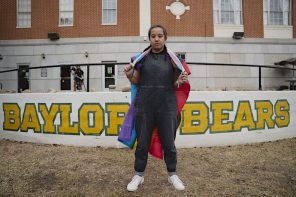The Christian Savior was single; that fact warrants further reflection.
One of the more striking things about all of the ink that has been spilled over California’s now-infamous Proposition 8 (and its long legal aftermath) is the almost reflexive assumption on all sides that marriage, somehow, is a norm—a desirable norm. And so the argument swiftly becomes an argument about normalcy: about who is normal, and about who may be privileged to participate in normalizing social institutions like marriage.
On the Constitutional side of the ledger, the question hinges on a legal conception of discrimination, regarding what forms of discriminating judgments a secular state and secular laws are permitted to make. To use the jargon of the courts, any state that wishes to make “discriminating judgments”—that is, to distinguish one group of citizens from others according to some social taxonomy, and thus to set them apart as a group—will be subject to legal “scrutiny,” scrutiny that permits different levels of “strictness.”
For example, if the modern state ever wishes to use racial categories in making policy, then, because of our checkered and very bloody racial history, these discriminating laws and policies will be subject to the very strictest scrutiny. (That is what has bedeviled affirmative action policies of late; even using such categories for the noblest of purposes is Constitutionally suspect, at least at the outset.)
If the state wishes to use gender categories in making certain discriminating judgments, such as Title IX’s creation of separate but equal athletic institutions at the nations’s colleges and universities, it has an easier time. Such laws will be subject to far less strenuous scrutiny, and the state will not be required to lay out its “compelling interest” in making such discriminating judgments to the same degree; in other words, no state will be mandating unisex toilet facilities any time soon.
Our current tax laws also rely on discriminating judgments according to categories of social class, and they are subject to even less severe scrutiny; the rich pay a higher percentage than the poor, and that is a discriminating judgment that does not seem too discriminatory… to most.
When it comes to the modern categories of sexual identity, the courts have had a devil of a time deciding what level of scrutiny is required to justify their use. It is not clear whether categories that discriminate among various persons according to the gender of their sexual object (or marital) choice function more like racial categories, or like gender categories, or socioeconomic ones.
That such sexual categories are sui generis (and utterly modern) complicates things still further.
And so the debate goes on. Gays, lesbians, and transgendered persons insist that they are normal, that they are equal to everyone else in the eyes of the law, and that they are entitled to participate in the selfsame social institutions, like marriage, as all other citizens.
The idea here is that laws such as those proposed in California, laws that seek to create a separate class of citizens according to the discriminating categories of sexual identity, are actually instituting a discriminatory legal no-no, unless the state can show a far more compelling state interest in categorizing and sorting its citizens of a marriageable age according to the categories of sexual identity.
As I have listened to this debate unfold, I have been puzzling over a different discriminating judgment, one that has not received the attention it deserves, and one that brings me back to the singleness of the Christian Savior.
How can a secular state justify its desire to discriminate between married persons and single persons? What compelling state interest is served by creating such social groups? Why should citizens be required on many government forms to check the box that identifies them as “Single” or “Married” or “Divorced,” and why are there no other options (not even “Other”)?
I am not convinced that the state’s desire to make this discriminating judgment can survive even semi-strict scrutiny. In short, Proposition 8 may be unconstitutional not because it discriminates according to sexual categories, but because it discriminates according to marital ones. By subtly making marriage the norm, this debate looms far larger on the horizon created by Proposition 8 and carries within it some unexpected implications.
I suspect that when this debate has made its way through the courts, a new issue will have emerged: that the state has no business in the marriage business, period. Once upon a time, some states did indeed have a vested interest in legitimating and normalizing marriage. This social institution created lines of legitimacy, lines that were crucial for establishing lines of inheritance and what have you. But we have other ways of handling these matters now. Religious communities can decide freely, and according to their own particular (traditional or not) norms, what sorts of “marital” couplings to recognize and even to celebrate, but it is not immediately clear what business the secular state has in sanctioning such unions.
And so the end result of this long debate—and it will be a long one—may have the unintended consequence of lending a newly aggrieved social group a more public voice: those single or quietly cohabitating persons who are tired of hearing arguments about the legitimacy or the sanctity of marriage (marriage was always the most secular of sacraments, after all, even in the Middle Ages).
The end results of the legal challenges currently being pursued by all sides on this question may be as unexpected as they will be intriguing: the realization that a secular state cannot justify its continued involvement in the social institution of marriage.
But this outcome may well prove to be a form of secularism that even the most strident of secularists may have a hard time accepting. That is how deep the cultural commitment to such a social convention runs in the United States today. Jesus may not have been married, but he went to weddings and even blessed one with wine.
But he did not marry himself, and the modern state would not have recognized his relationship with the mysterious Mary at all. No tax breaks for Jesus and the Magdalene. So what to make of the legal sanction of a discriminating judgment that would make the Savior a second-class secular citizen?




